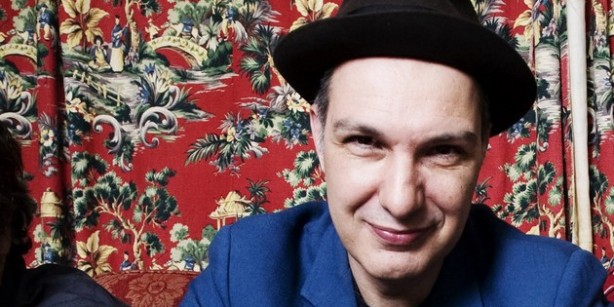 Music
Music
Q & A: Dave Bidini on his near-biography of Gordon Lightfoot, and his baseball movie with Geddy Lee and Jay Baruchel
by Sam Sutherland
October 27, 2011
Dave Bidini is a busy dude. He is the author of ten books, most about music, sports, or some combination of the two. He is a National Post columnist and a founding member of the Rheostatics, a band stitched into the very fabric of Canadian musical identity. He plays regularly with his own Bidiniband, adapts his books into movies and mini series, and kind of seems to be everywhere at once.
His latest book is called Writing Gordon Lightfoot. The title is both a red herring and a tilt of the hand; with the subtitle “The Man, the Music, and the World in 1972,” it would be easy to approach Bidini’s latest as a straight biography of one of Canada’s great songwriters. But Writing is about a lot more than that, a fact that becomes immediately apparent through its unorthodox style, structure, and duel narrative. Bouncing between confessional, personal letters to Lightfoot himself (who refused to be interviewed for the book) and the worldwide events leading up to Mariposa folk festival in 1972, it’s a book about Spassky versus Fischer and the formation of the World Hockey Association, a loveletter to ’70s Canadiana and Rolling Stones tour confessional. It’s a lot of different, fascinating things, making it one of Bidini’s most rewarding works.
It also makes an offhanded mention of AUX favourite, Damian Abraham of Fucked Up. When we get Bidini on the phone to talk about his book and future plans, it’s a pre-interview tweet about this fact that launches us into conversation.
Dave Bidini: It’s funny you mentioned that thing about Damian, because that’s the last thing I changed before it went to print. I think I had Diamond Rings in there or something, and my editor didn’t know who it was. So I said, “Do you know who Damiam Abraham is?” And she said no. But I told her to put him in there instead. I had run into him at a Vietnamese restaurant on Bloor Street and I thought he’d get a kick out of it.
AUX: I’m going to go ahead and ask the questions you will be continued to ask every time you talk about this book.
That’s okay.
Has Gord read it?
We had our launch party last night, and one of his best friends came, and was apparently trying to get him out. But if I was Gord, I wouldn’t have come. I would like him to read it. I would like him to come to my house every Friday for dinner, and we could be buddies and shoot pool together and watch hokey, but it doesn’t matter. I don’t really care. You can’t worry about the reactions of whoever you put into your book. You do the best you can do. I think at one point in the book I do appeal to him and say, “Hey, man, you’re lucky I’m writing this book, and not some muckraking journalist, being senstive to the life.”’ I hope he feels like he caught a bit of a break.
Was the idea always to tie these different narratives into a story about Gordon Lightfoot?
I found this Mariposa ’72 episode early on, and I thought I could built the book around a reconstruction of the week and that event, with Lightfoot in the centre. I had done all this research and I had all this raw matter, and I thought I would use it, which is how it became this double-header. The way it’s supposed to work is like a hard-soft, light-dark. The letters are very warm and fleshy, and the alternating chapters of the week are very cold.
Was there a point when you were writing it that you realized it had become about more than just providing context? In some way, Gordon Lightfoot starts to feel like a stand-in for Canadian identity and character.
I think all the books, or any kind of art that you create, you always aspire—the subject is the horse you ride in on—but the scope of the book is what you see in front of you. People have said to me, “I don’t really like hockey, but I like Tropic of Hockey.” The baseball book is the same way. Every book I try to do that. The subject of the book is the vessel through which you explore a greater reality and touch on these universal themes. The Lightfoot thing—I think what you say is an interesting observation. I didn’t want this to be a book where all the fetishistic details of a celebrity’s life were explored. You want it to be about something greater beyond that. I think it will disappoint people who pick it up expecting a biography. And you’re right, by the end, it’s a bit of a Frankenstein. You’ve got Lightfoot, you’ve got me, you’ve got Canada and Bobby Hull and the whole Mariposa crew. At the end you have this wide gallery of figures. You hope the reader is able to enjoy the ride, but you really hope that they can look back and see their own lives reflected in it. I think it was a good time to use Lightfoot as a symbol. Canadian life is very different than it was when he started out. I felt the same about On a Cold Road. It seemed important to keep those stories alive. When those people are gone their stories are gone, but those are the stories on which other lives are built.
To totally change tacks, you’ve been tweeting about working on the Baseballissimo movie. What’s the status of that project?
Jay Baruchel and his writing partner Jesse are working the script now. They’ll have the script delivered to us by Christmas. It’s great. We’ve had tons of interest in terms of getting the film made without actually having a working script. So it looks really positive. Those guys did a 10 page treatment of the film and I feel like they really get it. And Geddy [Lee, as in, of Rush, who is connected to the film] has run a band for 25 years, so he’s a natural producer. He’s a great communicator, and he’s great at gathering people together. We’re hoping for TIFF in 2013, which probably means shooting around the end of next fall. When Baseballissimo came out, it wasn’t that well promoted, but the people who liked the book really liked the book. It’s so neat that it’s had this second life 12 years after it came out. It just goes to show that if you have a good story and you believe in a good story, you never know where it’s going to lead.
Tags: Music, Interviews, Lists, News, Damian Abraham, Dave Bidini, Fucked Up, Rush





